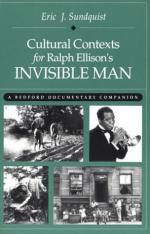|
This section contains 1,417 words (approx. 5 pages at 300 words per page) |

|
SOURCE: Herman, David J. “Ellison's ‘King of the Bingo Game’: Finding Naturalism's Trapdoor.” English Language Notes 29, no. 1 (September 1991): 71-4.
In the following essay, Herman discusses aspects of “King of the Bingo Game” that undercut its apparent literary naturalism.
Prima facie, Ralph Ellison's “King of the Bingo Game”1 fits squarely into the tradition of literary naturalism.2 Ellison's extended treatment of the bingo wheel, for one thing, figures the same overriding concern with the issue of fate versus chance—the issue of determinism—manifest in, say, the famous open-safe scene in Dreiser's Sister Carrie, or in the closing pages of Norris's The Octopus. If anything, Ellison's story addresses the notion of determinism even more explicitly than is customary in naturalistic works. For Ellison's (literally) nameless (449) protagonist attempts self-consciously to eliminate chance, to control the wheel of fortune itself, by refusing to relinquish his grasp on the button whose release determines...
|
This section contains 1,417 words (approx. 5 pages at 300 words per page) |

|


